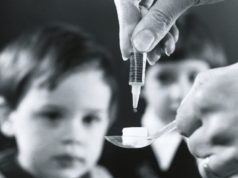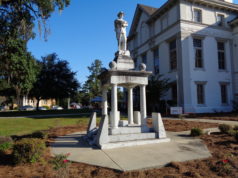
Harvey and I were chowing down on an excellent plate of Alice B. Toklas fudge when there was a knock on the door. It was Richard Nixon.
“Come in and pour yourself a cool one,” I said. “And pull up an empty chair.”
“Don’t mind if I do,” he replied as he headed toward the fridge.
“What brings you up from Purgatory?” I asked as he settled into an empty chair, which then remained empty.
“I got some time off for bad behavior,” he said. “So I’m doing an election analyst gig for Fox News.”
“That’s pushing the envelope on the fair and balanced thing, isn’t it?” I asked.
“I suppose,” he said. “But I promised Roger Ailes that the first time Bill O’Reilly interrupted me I would grab a Civil War rifle with a bayonet, let out a blood-curdling rebel yell, leap over the table and pin his tongue to the floor.”
“Well since you’re doing political commentary, I have a question,” I said. “Do you think this is going to be the dirtiest presidential election in history?” Nixon choked on his drink, spraying a mouthful of foam across the room.
“You’ve got to be kidding,” he said when he finally got control of himself, tears of laughter running down his face.
“The dirtiest campaign ever? You 21st century weenies have no idea what genuinely dirty campaigning is like. Just go to iTunes and listen to some of the campaign songs from after the Civil War.
“My favorite is ‘The Bloody Hand of Treason’ from the Hayes-Tilden campaign,” he added brightly.
“Hey, dirty campaigning didn’t end in the 19th century,” I countered.
“Compared to what went on then, today’s mud-slinging is patty cake,” he said.
“Because voters are better informed and more sophisticated today?” I asked.
“No, it’s because today more than half the voters are women,” he said. “Girls are put off by that kind of shit. If you’re going to run a negative campaign today, you have to be more subtle.”
“Your negative campaigns were about as subtle as a jack-hammer,” I said.
“You’re right,” he said. “But when I took out Jerry Voorhees and Helen Gehagen Douglas, politics was still mostly a guy thing. Those campaigns wouldn’t work today.”
“Do you still approve of smear campaigns?” I asked.
“Let me put it this way,” he said. “An old Tammany Hall Pol named George Washington Plunkitt once made a distinction between ‘honest graft’ and ‘dishonest graft’. He said honest graft was when ‘I seen my opportunities and I took ’em’ — by which he meant using insider information for personal gain. He defined ‘dishonest graft’ as outright theft of public funds or blackmail.”
“I look at smear campaigns the same way,” Nixon said. “There are honest smears and dishonest smears. Honest smears are when you pick up on something your opponent said or did and spin it to fit your narrative — like when Obama goes after Romney on Bain or for not releasing his tax returns. Or when Romney goes after Obama for his ‘You didn’t build that’ crack or for raiding Medicare to pay for Obamacare. They may be quoting out of context and spinning like whirling Dervishes, but they start with a kernel of truth. I’m cool with that kind of negative campaigning.”
“Give me an example of a dishonest smear campaign,” I said.
He hesitated for a moment. “You know, the dirtiest thing I ever did in politics — other than Watergate, of course — was take out Edmund Muskie’s presidential campaign with the Canuck letter.”
Harvey looked at him quizzically. “Let me refresh your memory,” he said. “The letter surfaced in early 1972 before the New Hampshire primary. It was supposedly written by a man who claimed he had heard Sen. Edmund Muskie of Maine, the front-runner for the Democratic nomination for president at the time, derisively refer to Americans of French Canadian ancestry as Canucks. It was actually written by one of my operatives. There were a lot of Americans of French-Canadian ancestry living in New Hampshire at the time.
“The letter was a complete forgery. There was not a shred of truth in it. But a lot of people bought into it, and Muskie grew so frustrated trying to refute it that he cried in public. In 1972 that was enough to cause his campaign to implode.
“That was a dishonest smear,” he said. “So will a dirty, negative smear campaign decide this year’s election — even if it’s a kinder, gentler smear campaign than one in the good old days?” I asked.
“Look,” he said. “There have been over 50 U.S. presidential elections since 1790. When was the last clean one?”
Respond: [email protected]














